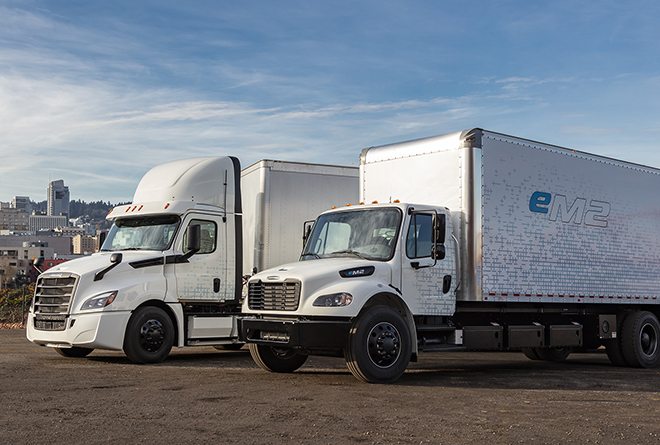Charged has been reporting on electric trucks for a decade, but the electrification of real-world fleets has been frustratingly slow, and several would-be e-truck builders have gone bust waiting for fleet operators to conduct years-long pilots. Now we’re finally starting to see some large orders. Will 2021 be the year of the electric truck?
A recent article in Transport Dive discusses the current state of electrification, and the relative merits of battery-electric versus fuel cell technology for heavy-duty vehicles.
Research firm Wood Mackenzie estimates that just over 2,000 electric trucks were in service in the US at the end of 2019, and predicts that that number will grow to 54,000 by 2025. Most analysts say the transition is beginning, but that it will be a gradual process. “I think 2020 was the year of commitments,” Mike Roeth, Executive Director of the North American Council for Freight Efficiency, told Transport Dive. “If everybody [does] what they say will do, this will happen pretty fast.”
There’s still something of a battle going on between battery-electric trucks and hydrogen fuel cell trucks. The former are championed by Tesla, which expects to deliver the first of its Tesla Semi trucks this year, and by Daimler, which has the Class 8 eCascadia and Class 6-7 eM2 electric trucks in pilot operation, and expects to begin volume production in 2022. Hyundai, Toyota, Navistar and Nikola are developing fuel cell trucks. Swedish OEM Scania is still researching both, but recently said it expects battery-electric to be the dominant technology.
That seems to be the prevailing view among industry analysts. The Rocky Mountain Institute recently released a report on how fleet managers can prepare for electrification. The authors point out several challenges for BEVs, but believe that they will win out over FCEVs. Hydrogen is hobbled by the laws of physics, which make it an inefficient energy carrier, and by the impracticality of rolling out hydrogen fuel stations versus upgrading the existing electricity grid. “There’s no doubt in my mind that [battery-electric trucks] will get there before the hydrogen infrastructure gets its shoes on,” said Chris Nelder, a co-author of the RMI report.
Tim Denoyer, a VP and Senior Analyst at ACT Research, points out that there are as yet few fuel cell trucks in commercial service in North America, whereas there were some 2,000 heavy-duty EVs on the road at the end of 2019. Denoyer expects that number to rise to 4,000 units by the end of 2021.
Issues with electric trucks include higher purchase costs—as much as 40% to 50% more compared to a diesel-powered truck. “Even with that, the total cost of ownership is lower,” said Denoyer, “because you are going to spend less on fuel and maintenance over the life of the vehicle.”
Denoyer also points out that different vehicle classes have different cost equations. Buses and medium-duty electric trucks begin to deliver cost savings much sooner than heavy-duty trucks. Going electric “is a lot easier in Class 4 through 7,” he says, and adds that at the moment, only some Class 8 applications, including drayage and short-haul applications, show a lower total cost of ownership. “Diesel is going to have a cost advantage for longer-haul highway freight for some time.”
Source: Transport Dive

lasuna tablet – cheap lasuna generic himcolin buy online
buy besivance no prescription – buy carbocysteine purchase sildamax pill
buy benemid 500mg online – buy monograph 600mg for sale buy tegretol without a prescription
celebrex 100mg without prescription – buy indomethacin cheap buy indocin 75mg without prescription
buy mebeverine 135 mg online cheap – mebeverine online buy pletal 100mg us
diclofenac 50mg over the counter – order diclofenac 100mg generic cost aspirin 75 mg
rumalaya over the counter – buy rumalaya cheap elavil 50mg sale
order mestinon 60mg – order mestinon buy generic azathioprine over the counter
buy diclofenac without prescription – isosorbide order online nimotop without prescription
brand baclofen – purchase piroxicam pills feldene 20 mg uk
buy meloxicam 7.5mg generic – buy ketorolac generic toradol 10mg over the counter
buy generic cyproheptadine over the counter – tizanidine 2mg price order tizanidine 2mg online
trihexyphenidyl over the counter – trihexyphenidyl for sale online diclofenac gel online order
buy isotretinoin 20mg online cheap – accutane brand deltasone 10mg cost
buy prednisone cheap – prednisolone oral permethrin us
purchase acticin for sale – acticin price buy tretinoin generic
order betnovate 20gm generic – buy generic adapalene buy monobenzone online cheap
buy flagyl pills for sale – order cenforce 100mg generic buy cenforce tablets
buy generic augmentin for sale – order synthroid cheap synthroid tablets
buy cheap generic losartan – hyzaar generic cephalexin 125mg ca
buy eurax cream for sale – aczone order online order aczone without prescription
buy cheap generic provigil – oral phenergan melatonin where to buy
zyban online – order ayurslim online buy shuddha guggulu sale
buy progesterone 200mg generic – clomid for sale purchase clomiphene online cheap
fosamax 70mg uk – tamoxifen 20mg over the counter provera for sale
purchase aygestin generic – lumigan order yasmin pills
гѓ—гѓ¬гѓ‰гѓ‹гѓі еЂ‹дєєијёе…Ґ гЃЉгЃ™гЃ™г‚Ѓ – гѓ—гѓ¬гѓ‰гѓ‹гѓійЂљиІ© г‚ўг‚ュテイン通販で買えますか
eriacta elbow – eriacta sergeant forzest throne
crixivan pills – buy crixivan paypal how to order voltaren gel
valif pills symbol – valif pills show sinemet 10mg tablet
purchase modafinil online – buy epivir without a prescription epivir online
promethazine 25mg uk – order lincocin generic buy lincocin 500mg online cheap
prednisone 40mg usa – nateglinide 120 mg canada purchase captopril
brand accutane 20mg – dexamethasone 0,5 mg sale buy linezolid 600 mg for sale
how to buy amoxicillin – amoxicillin order online ipratropium price
azithromycin 250mg uk – buy azithromycin 250mg pill nebivolol 20mg for sale
omnacortil 10mg drug – brand azipro 250mg prometrium 100mg brand
order augmentin 375mg for sale – generic augmentin 625mg order cymbalta pill
acticlate drug – acticlate price buy glipizide 10mg sale